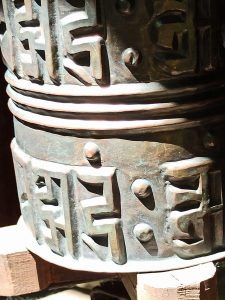 The foundational teaching of many spiritual/religious traditions begin with some version of “We are One.” This leads believers to the notion that compassion arises out of a deep awareness of our fundamental connection with other beings. However, a problematic misinterpretation of this concept can lead some to the delusion that the awareness that “we are One” means “I am special”.
The foundational teaching of many spiritual/religious traditions begin with some version of “We are One.” This leads believers to the notion that compassion arises out of a deep awareness of our fundamental connection with other beings. However, a problematic misinterpretation of this concept can lead some to the delusion that the awareness that “we are One” means “I am special”.
“I am special” thinking comes from the misapplication of the big teachings of faith to our everyday struggles. When we feel connected to that idea of ‘Oneness’, it can make the ups and downs of life a bit easier to manage. And some of us begin to see signs of this Oneness all around us (what can be classified as ‘magical thinking’), giving us more comfort. This kind of thinking, though offering us comfort, can also lead to big problems when we start to consider things like public health policy in a Global Pandemic.
The “Oneness” concept actually aligns well with the physical sciences. We are, literally, made from the same material as the rest of the stuff in the Universe – we are star dust. Our biological forms can be analyzed using statistics – statistics is the mathematics of systems, not individuals. Statistics can predict animal behavior (including humans). It can predict trends in viral transmissions in the same way it can be used to predict weather patterns. The efficacy of mathematical modeling of humanity indicates that “We are One” is not a bad model for our species. Systems based analysis can show us where the system is broken, even if individuals in the system do not perceive it to be.
The trend in many modern spiritual/religious traditions has shifted this systems thinking to individualist thinking. “I am special” thinking can be very helpful, in the short term, for those who are feeling lost or overwhelmed, but it should be seen only as a tool and never as a goal of spiritual practice. When we begin to believe “I am special because I know that we are one (or I know God’s mind, etc)“, we create a fundamental contradiction in how we perceive the world.
We can see the potential harm from such thinking in the strong resistance to public health polices being proposed across the world in 2020. Scientists who analyze the viral behavior (which is intimately connected to human behavior), they see trends and make predictions about what can shift these trends based on a systems analysis. However, our individual experiences while living with an invisible threat, may be in direct contradiction to the analysis of the systems expert. If the world in my immediate vicinity seems fine, then why are these ‘experts’ telling me otherwise? If I have never known someone, personally, who has been gravely ill or died from this invisible threat, why should I believe it will impact me…. After all, I am special.
The problem is, all evidence indicates that we are, in fact, One system – whether or not we perceive it. So, as a highly contagious virus spreads around the world, it will continue to do what it does, and the only weapon we have against it, for the time being, is to change our socialized behavior (it may feel like instinctual behavior, but it is behavior our society has taught us).
Poor leaders create a false dichotomy – “there is nothing we can do so we must give up changing our lives” or “the only think to do is to lock everyone away until we have a cure/vaccine”. This dichotomy creates tremendous fear and confusion as people need strong support in behaving in a way that support the whole. In fact, the reason that the spiritual/religious exist in the first place, is because acting as if “we are One” can be in direct contradiction to our socialized behavior.
Good leaders, on the other hand, recognize that they are asking people to go against their natural inclinations. Good leader prepare people for the challenges that behavioral changes will create (and also give people less opportunities to act in a way that endangers everyone). They make a plan based on the systems analysis and risk/benefit analysis. Good leaders walk people through it, again and again. The tell tale of a good leader, in this scenario, is that the plan will change with time, and these changes will be communicated in many ways. A good plan involves action and analysis, then more action and more analysis. This kind of approach continues in as many iterations as needed until the responsibility of controlling infections is out of the hands of the public.
in 2019, on a flight from Rome to Germany, I was seated next to a young priest who happen to be from a small town close to my home town in Germany. We had a beautiful conversation on faith and the legacy of St. Francis of Assisi. As we parted, he gave me a flyer for a community event he was organizing, and on the flyer, was a sentence on the importance of how we live our own lives and its relationship to universality. It translated to something like, “The example of ones life should inspire the community to follow on the path of Oneness.”
Seeing our lives as and example in our community, how ever small, what kind of example are we?
Can we expand the universal thinking to the individual life choices of those around us, even if it leads to discomfort or even pain (emotional, financial, physical)?
How are we supporting our community in these times as we move forward together?
